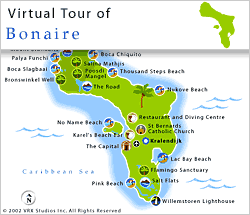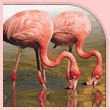
Bonaire | Hotels
Sunny Bonaire is a Dutch treat featuring photo, sports and sightseeing opportunities galore. Its picturesque capital with the improbable name of Kralendjik has a rich Dutch heritage and a rebuilt "downtown" that is a must-see. Dutch is the official language but not to worry. English is commonly spoken, also Spanish (the island is just north of the Venezuelan mainland) and Papiamento, a wild mixture of Dutch, Spanish, English and only God knows.Bonaire - Destination guide 

Caribbean Information Centre
Caribbean.com is a travel site specializing in The Bahamas, Bermuda and the Caribbean region. Our destination guides contain thousands of listings and virtual reality map tours to help you plan your perfect vacation. Listings include hotels, restaurants, activities, attractions, diving, snorkelling and shopping for 50+ destinations.Bonaire feature 
CARIBBEAN.COM 2004 - COURTESY DUPUCH PUBLICATIONS

All about Bonaire
Think pink and "birds of a feather flocking together." That's what it's all about on Bonaire, island home of thousands of pink flamingoes. They mate and nest annually in shallow lagoons at both ends of the island, particularly in Great Salt Lake on the southern side. Don't settle just for clouds of long-necked pink birds. Bird fans can also expect to spot hundreds of green parrots, parakeets, warbirds, herons, terns, pelicans and other tropical frequent flyers.
Should you tire of watching the skies, go down to the sea in diving and windsurfing attire. Bonaire is said to have the best windsurfing sites in the area.
Bonaire is the perfect venue for reef diving. The island is completely surrounded by the unique Bonaire Marine Park. There is also a 1,500-acre offshore cay called Kleine (Little) Bonaire. You will find, within park waters, about 80 public moorings for boats and 86 marked dive sites, most of them with gin-clear waters, the better to see amazing coral gardens and tropical fish of every colour.
About half of Bonaire visitors go for the water sports. The others hike and sightsee in the huge Washington-Slagbaai National Park - or go swimming, biking, shopping or just relax. Because of a dearth of tourists, Bonaire beaches tend to be the least exploited and developed in the Caribbean. Just south of the airport is Donkey Beach. Donkeys and wild goats were introduced to the island more than 300 years ago. You can still see them wandering about and nibbling at cactus fruits and tree leaves.
The most famous of the island's sands is called Pink Beach. The sand turns pinkish as a result of water interacting with saltpans on the island. Salt remains a main industry, with huge mounds of salt to be seen at the southern tip of the island.
The island capital is a clean, neat, small town called Kralendijk, Dutch for coral dyke. When the Dutch took Bonaire from Spain in 1636, they set up a salt industry to take advantage of the fine harbour at Kralendijk. Bonaireans called their main town Playa, Spanish for beach. On its two streets, you will find restaurants, bars, shops and government buildings. Fort Oranje, built in the 18th century, never saw any action. However, its four cannon balls remain ready for use, just in case.
Laid-back, easy-does-it Bonaire has excellent roads from end to end, an airport named Flamingo, and good, affordable hotel accommodations. A "guided snorkelling" programme is available so that you can rent snorkelling equipment, see snorkelling demonstrations and receive instructions in this popular sport. Other options include bicycling, and big game fishing for wahoo, marlin, swordfish, tuna, and smaller fish such as bonefish. Boat trips and charters are available. A Chinese junk is famous for its night and "moon" trips, with Thai dinners aboard ship as an added attraction. Just south of Flamingo Airport is a kunuku, Papamiento word for country or farm. Here, you can go horseback riding, use a swimming pool and golf driving range, visit a small aviary, and entertain the youngsters with a kids' playground, complete with pony rides.
Bonaire offers several fine stores, boutiques and a mini-mall for shopping. For food shopping, the largest supermarket on the island is called Cultimara. In the area of entertainment, there are occasional folklore performances and a small selection of nightclubs, bars and discos. Bonaire has two casinos, one at the Divi Flamingo Resort and the other at Plaza Resort. The island capital also sports a two-screen cinema.
Bonaire - Items of interest 
Accommodations
Dining & entertainment
Activities, attractions, diving, golf and sports
OTHER LINKS AND INTERESTS

Sign up, its free!
Get deals & specials for
Caribbean Vacations
CLICK HERE
*we do not release contact information
CARIBBEAN.COM VACATION SPECIALS
Click here for vacation specials from our partners: Hilton, Westin, Sheraton, Marriott and more





